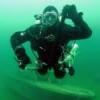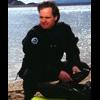yep, that's what I think too.It is possible that the death would have occurred with or without the activity, but there is no clear delineation of the cause and it makes diving "look" like more deaths are occurring from the sport than actually are.

Why Tech Diving?
#61

Posted 29 January 2005 - 09:16 PM
Once in a while, it is good to step back, take a breath, and remember to be humble. You'll never know it all - ScubaDadMiami. If you aren't afraid of dying, there is nothing you can't achieve - Lao-tzu. One dog barks at something, the rest bark at him - Chinese Proverb.
#62

Posted 29 January 2005 - 09:41 PM
The fatal part starts on page 77.
There are a number of interesting facts in there; here's a few.
Only 12% of those who died were underweight or of normal weight.
33% were overweight.
55% were obese.
There were 89 diving fatalities in that year.
Five were students in open water (!) training (there's my point being made for me ww....) If we take PADI's stats on OW divers certified (900k) annually, and their number on total divers (20m, roughly), then we'd have to norm that 5 to represent the proportion of total divers - which would require you to multiply that fatality count by 22 - or 110 "normed" deaths. This means you are 124% as likely to be killed during your initial open water class WHILE UNDER "TRAINED" INSTRUCTION as you are during your entire remaining diving career!
27 of those deaths were by AGE (30%). 18 were due to rapid ascent, and of those, 14 (16%) were apparently due to attempted CESAs (out of air precipitated the rapid ascent.)
Cardiovascular disease was reported to be causitive in 30% of cases in 2002. It has fluctuated from 20 to 30% over the last few years.
The patterns are striking in these reports.... IMHO they bear close study by all divers, because the best way to avoid problems is to learn why others have had them.
#63

Posted 29 January 2005 - 09:44 PM
That just makes it more clear that its your responsibility to know where you are in the system at all times and to confirm navigational changes.it's only standard practice in America.
It did leave me with a question though - is it not common to have penetration distances written on the line arrows down there? It is in Florida - I've not dove in the Cenotes.
foreign countries, and especially Mexico are notorious for unmarked lines. Outside the US there is no standard on what the mainline consist of. Following the line you might encounter varying thichness and color, and even a confusing number of T's.
I've been known to drop pins where they're not "strictly necessary", just so I know when coming back through on exit that I'm going down the right line....
Thanks for the update - not having dove in the Cenotes, I didn't know if they commonly gave distances to the closest exit or not on their permanent line markers.
#64

Posted 29 January 2005 - 10:15 PM
i am the cookie monster.That just makes it more clear that its your responsibility to know where you are in the system at all times and to confirm navigational changes.it's only standard practice in America.
foreign countries, and especially Mexico are notorious for unmarked lines. Outside the US there is no standard on what the mainline consist of. Following the line you might encounter varying thichness and color, and even a confusing number of T's.
I've been known to drop pins where they're not "strictly necessary", just so I know when coming back through on exit that I'm going down the right line....
Thanks for the update - not having dove in the Cenotes, I didn't know if they commonly gave distances to the closest exit or not on their permanent line markers.
i will mark the line anytime i feel it could help me find the exit or make and escape in the possible confusion and panic of a possible emergency.
given the standard practices in the US i don't need to go through this extra "trouble" but i gives me a warm fuzzy and presence of mind.
#65

Posted 30 January 2005 - 01:15 AM
Ah the power of numbers...2002 appears to be a good year for your arguement!If you're a DAN member, go log in and look up the 2004 report on incidents. It covers the year 2002.
The fatal part starts on page 77.
There are a number of interesting facts in there; here's a few.
Only 12% of those who died were underweight or of normal weight.
33% were overweight.
55% were obese.
There were 89 diving fatalities in that year.
Five were students in open water (!) training (there's my point being made for me ww....) If we take PADI's stats on OW divers certified (900k) annually, and their number on total divers (20m, roughly), then we'd have to norm that 5 to represent the proportion of total divers - which would require you to multiply that fatality count by 22 - or 110 "normed" deaths. This means you are 124% as likely to be killed during your initial open water class WHILE UNDER "TRAINED" INSTRUCTION as you are during your entire remaining diving career!
27 of those deaths were by AGE (30%). 18 were due to rapid ascent, and of those, 14 (16%) were apparently due to attempted CESAs (out of air precipitated the rapid ascent.)
Cardiovascular disease was reported to be causitive in 30% of cases in 2002. It has fluctuated from 20 to 30% over the last few years.
The patterns are striking in these reports.... IMHO they bear close study by all divers, because the best way to avoid problems is to learn why others have had them.
Contact me directly at Kamala@SingleDivers.com for your private or group travel needs or 864-557-6079 AND don't miss SD's 2018-2021 Trips! ....here! Most are once in a lifetime opportunities...don't miss the chance to go!!
SD LEGACY/OLD/MANUAL Forms & Documents.... here !
Click here TO PAY for Merchandise, Membership, or Travel
"Imitation is the sincerest flattery." - Gandhi
"Imitation is proof that originality is rare." - ScubaHawk
SingleDivers.com...often imitated...never duplicated!
Kamala Shadduck c/o SingleDivers.com LLC
2234 North Federal Hwy, #1010 Boca Raton, FL 33431
formerly...
710 Dive Buddy Lane; Salem, SC 29676
864-557-6079 tel/celfone/office or tollfree fax 888-480-0906
#66

Posted 30 January 2005 - 02:59 AM
2002 saw 86 shark attacks with 47 of them being in U.S. waters. Of these, 4 of the attacks were on divers. So, you are almost as likely to be attacked by a shark while diving as you are to die during open water training.
You need the whole story to really understand the accident and therefore the risk. You're pointing out the high number of fatalities in training while someone else could use a similar death toll to point out the low risk of shark attack.
I remember back in high school our phys ed teacher showed us that the odds of winning the lottery were the same as getting pregnant while on birth control. It's funny how the girls were looking at the numbers thinking "I probably won't get pregnant," while the lottery players were looking at the same numbers and thinking, "I might win!"
My interesting observation of diving accident analysis is that when it comes to "high risk" sports such as diving, the participants will get really anal about stats and also about being incredibly exact with safety like the tech & cave communities. Yet, the participants of these sports who worry about dying underwater today think nothing of purchasing motorycles, eating bacon double cheeseburgers, having sex, smoking, and traveling to exotic lands where Ebola 50 is just waiting to find its way into an airline cabin.
Trace
Technical Training Director
PDIC International
#67

Posted 30 January 2005 - 11:30 AM
The death stats are from DAN, and are worldwide. DAN is not perfect (they're not the police, and don't have access to all the information), but they do get a privileged look at autopsy and other reports. They also independantly analyze accidents and draw their own conclusions. In several cases they state that their believed cause of death, based on the evidence, is not what is listed on the coroner's certificate. Since they're the diving doctors with forensics expeerience, their guess is probably better than an ordinary physician's.
The death stats, including those while under training, are worldwide and not PADI specific. The 5 deaths while in training that year were all during OW classes; I think there was one more during a "search and recovery" class (would have to go back and check.)
I believe PADI overreports the number of certifications issued (their numbers are worldwide as well, so it is claimed) for marketing reasons. AUDITED figures have consistently come in at a third or so of their claims. However, if they are inflating the numbers, that just means that the risk of being killed by an instructor is actually higher (perhaps by a factor of three!) than it first appears. I will cede that there is no accurate way to get the denominator for the "death rate" accurately - although it is clear that, as you pointed out, you're about as likely to be hit by lightning as you are die while diving, and it is definitely more dangerous to drive to the boat (or cave, or spring, or wherever) than it is to dive once you get there.
Like I said, go read their report (if you're a member, you can get access to it via the web - its a big PDF file.) I always do when the new one comes out.
A couple of years ago I had this same sort of "fight" over risks - including that of deciding to "go one's own way" on another board. They eventually decided that they didn't want the heretic around (their right, as these things are private property, and besides, I have my own forum where I can speak freely) but before that happened I managed to get posted a complete categorization of the DAN stats from that report. It took me several hours to compile it; perhaps I'll do it for this one as well..... my interest at the time was categorizing deaths into dives performed at or within the diver's "formal" training, that in which uncertified divers were in an overhead, and other obvious and clear violations of "standards".
It showed basically the same thing that this report showed, specifically:
1. THE biggest risk factor by far (well over half of deaths) was being overweight or obese. Yet GUE, for all their fanatacism, does not refuse to train overweight divers. Tobacco abuse was mentioned in some, but by no means as many, incidents (DAN defines ANY use as "abuse", so there you go.) There goes GUE's claim that their tobacco position is about safety. Its not - fact is, JJ just plain hates smoking (this has been divulged in the past by GUE fokls when I have nailed them with these facts.) If he'd be honest I'd respect him for it, but he's not, so I don't.
2. A huge percentage of deaths are from AGEs, and of those, nearly all are connected with fast ascents (no surprise.) Barotrauma is absent in a majority of those incidents - in other words, the victim DID NOT hold their breath. OOAs and resulting CESA attempts are the "triggering incidents" for a majority of these incidents. Lesson? Carry redundancy with you and look at your freaking pressure gauge!
3. Coronary incidents kill a large percentage of those who die while diving. The various agencies (including DAN!) IMHO like this misreporting, as it makes diving appear more dangerous than it really is, therefore attempting to justify their position on training and the need for their continued existence. Ok, I'm not surprised.
4. There is no significant risk of death in excursions into places one is not trained to go. There is simply no argument to be made for it. Again, there is one dive park here in my area in which you could count the number of "uncertified" cave dives made daily in the hundreds every weekend or summer day. Have people died in there? Yes, several. Is the "over 300 have been killed doing this" claim on the reaper signs inaccurate? No. However, that 300 number spans thirty years, and not all have been uncertified or unknowledgeable. Among those 300 are counted the Darwin Award winner (trained) who decided to breathe a "decompression" cylinder containing 100% helium. Such stupid mistakes by people who do know better are included in the count, intentionally distorting the claim on the sign. The scare tactics, upon analysis, simply do not bear up to scrutiny. Lesson: The agencies would do far better to present on those signs the gear required to mitigate risks, and say "if you don't know how to use all of this, you may kill yourself in here." Who among us believed Reefer Madeness when it was shown to us in school? Are the "reaper" signs truly about safety, or are they marketing tools? I don't know the true intent, but my skepticism shows up fast when presented with a raw number without the actual risk (denominator) being quantified. Along those same lines, can you find any diver who has not made an excursion beyond their "formal training level"? I'm sure there are some, but I'm also sure that the number of dives made beyond those formal levels must number in the millions every year.
Failing to think in this activity can get you killed. So can reaching into the discharge chute of your lawnmower while the engine is running. Participating in an activity that by definition violates the safe continuation of your life without artificial assistance ought to be cause to think before acting. If not, well, my daughter will eventually be old enough to marry and start a family, and I would like the odds of her choosing a man with a decent grasp on reality to be higher rather than lower. As such I don't mind Darwin's influence one bit.
Wish it was warmer - its too darn cold to be diving today and the seas out in the gulf are NASTY!
Edited by Genesis, 30 January 2005 - 11:34 AM.
#68

Posted 30 January 2005 - 12:25 PM
On the first, I have two dive buddies that were forced to go other organizations because they are overweight. GUE would NOT train them. It might not be in the standards, but the instructors tend to add on to the requirements.1. THE biggest risk factor by far (well over half of deaths) was being overweight or obese. Yet GUE, for all their fanatacism, does not refuse to train overweight divers. Tobacco abuse was mentioned in some, but by no means as many, incidents (DAN defines ANY use as "abuse", so there you go.) There goes GUE's claim that their tobacco position is about safety. Its not - fact is, JJ just plain hates smoking (this has been divulged in the past by GUE fokls when I have nailed them with these facts.) If he'd be honest I'd respect him for it, but he's not, so I don't.
<snip out>
Wish it was warmer - its too darn cold to be diving today and the seas out in the gulf are NASTY!
On the second part (that I left), I agree. That's why I have to go to work today! <groan>
#69

Posted 30 January 2005 - 01:36 PM
You should see the photo (a few years old) that is circulating around the net of one Mike Kane.....On the first, I have two dive buddies that were forced to go other organizations because they are overweight. GUE would NOT train them. It might not be in the standards, but the instructors tend to add on to the requirements.1. THE biggest risk factor by far (well over half of deaths) was being overweight or obese. Yet GUE, for all their fanatacism, does not refuse to train overweight divers. Tobacco abuse was mentioned in some, but by no means as many, incidents (DAN defines ANY use as "abuse", so there you go.) There goes GUE's claim that their tobacco position is about safety. Its not - fact is, JJ just plain hates smoking (this has been divulged in the past by GUE fokls when I have nailed them with these facts.) If he'd be honest I'd respect him for it, but he's not, so I don't.
<snip out>
Wish it was warmer - its too darn cold to be diving today and the seas out in the gulf are NASTY!
On the second part (that I left), I agree. That's why I have to go to work today! <groan>
#70

Posted 30 January 2005 - 06:50 PM
Your post regarding AGE is just wrong. Your example of the woman climbing the stairs at Little River was not AGE. It is a bends hit. Bubbles caused by disssolved inert gas. That is no an AGE. AGE is not a pneumothorax either. A pneumothorax is barotruama that allows air or breathing gas to exscape between the lung and the chest wall into the plural cavity. This elminates the negative pressure that keep the lungs stuck to the chest wall the the lung collapses. AGE or Artial Gas Embolis is considered barotruama to the lung where breathing gas escapes from the lungs to the artial blood supply to the brain. It is gas from the lungs. This stops blood flow. Your example is a brain hit from the bends.
Your use of the numbers it a stretch. First the instructors did not kill these people. The students died. Fault is not necessarily to be placed on the instructor. Sometimes, people dive. Padi's at the open water level is only about 52% of the worldwide market. So, your analysis of risk can be cut in half just from that.
Mike Kane is a friend of mine and what is the point of trying to be disrespectful of someone that has not had anything to do with this post. He and I disagree on diving philosophy, but it does not mean I feel it is okay to bash him on this or any other forum. Clearly, you enjoy taking on the persona that GUE seems to like to use. A whole lot of bravado. Funny how those that speak the loudest tend to be the ones that happen to be the least talented in the water. Water is the great equalizer.
Your look at cave fatalities is simply wrong. Cave fatalities are well over 550 now, may be above 600. If you want the true break down of the stats, contact Jeff Bozanic. He is the keeper of the flies. Your view of the stats is just wrong. Yes, it is thirty years worth, but cave diving has got to be the least participated area of diving. Well over 300 of the fatalities are people who were not trained or were exceeding their training. Little River, I believe two or three years ago, Intro to cave divers scootering to the well head. One came out. Royal Flush, I believe last year, two OW divers die. Your perspectives amaze me.
Is this all about "stirring the pot", Genesis? I do not have the time to pick apart your posts point by point. I came here to avoid this kind of crap so we could have intelligent conversations that are not filled with proving you are right. Drowning people in verbage does not make what you say correct.
Grant
#71

Posted 30 January 2005 - 06:57 PM
Just to clarify, Terrence is a very good friend of mine, but he was not my mentor. I would have been happy to have him as a mentor. I met him too late for that. We are collaborators. We dive together, but the only things I completed with him was my Trimix Instructor rating. Simply because I had been working on it for years and had him come out to teach a course. So, since I had been trying to get the work completed forever, I finished it with him. We work on a great deal of things together. We have been evolving our training methods together. Precision diving and its approach has been a combined effort between the two of us. I help with the foundation on the west coast and am a research diver. Just to clarify the situation.
Grant
#72

Posted 30 January 2005 - 08:14 PM
ANY arterial gas embolus is medically considered "AGE". It can get there via two routes - either via direct insult due to pulmonary barotrauma, or via gas-phase separation in the arterial blood supply. The latter can be caused by too-rapid ascent even if no rupture of the alevolar bed occurs.Your post regarding AGE is just wrong. Your example of the woman climbing the stairs at Little River was not AGE. It is a bends hit. Bubbles caused by disssolved inert gas. That is no an AGE. AGE is not a pneumothorax either. A pneumothorax is barotruama that allows air or breathing gas to exscape between the lung and the chest wall into the plural cavity. This elminates the negative pressure that keep the lungs stuck to the chest wall the the lung collapses. AGE or Artial Gas Embolis is considered barotruama to the lung where breathing gas escapes from the lungs to the artial blood supply to the brain. It is gas from the lungs.
Pulmonary barotrauma is easily discerned on autopsy. If its absent, then that's not where the gas came from.
This is precisely why CESAs are so dangerous; even if you breathe out all the way up, and no breath-hold presents, you can wind up with bubbles in the arterial circulation.
You want to call it "DCI", go ahead. The fact remains that in a LOT of the "AGE" cases cited every year, there is no evidence of barotrauma on autopsy. Without barotrauma, there is only one way the gas arrived in that location.
I did not say that the instructors were at fault. Please read for content. I said that your risk of dying is higher when under instruction than afterward, as a percentage. Further, PADI is known to radically overstate the number of certs they issue - the evidence under audit is that the REAL figures are aproximately 1/3rd of their 'marketingspeak' numbers. Therefore, even accounting for their lack of 'saturation' of the market, the risk remains higher.Your use of the numbers it a stretch. First the instructors did not kill these people. The students died. Fault is not necessarily to be placed on the instructor. Sometimes, people dive. Padi's at the open water level is only about 52% of the worldwide market. So, your analysis of risk can be cut in half just from that.
Mr. Kane and I have gone around several times on the tobacco use and obesity issues within GUE's curriculum, and as one of their spokespersons who frequently injects himself into the debate on the 'net, as well as one of their representatives, he is "fair game" when the hypocrisy reaches him personally.Mike Kane is a friend of mine and what is the point of trying to be disrespectful of someone that has not had anything to do with this post.
In this case it has and does.
The fact of the matter is that you cannot find any statistical evidence for smoking being dangerous in the accident statistics. That is, if you look at the accident stats, you will find that fewer divers who have problems smoke than are represented in the overall population.
However, the exact opposite is true for overweight or obese divers.
Indeed, fully 80% of those who expire underwater are either overweight or obese.
IF an agency wishes to make a political statement on dive training that is actually backed up by the facts, the people to exclude are those who are not of normal body mass!
GUE doesn't want to face this, and neither do others who want to attack 'tobacco.'
I am not arguing that smoking is good for you. Clearly, it is not. I do not personally consume any form of tobacco, and prefer it if others don't do so aronud me. However, that does not mean that I condone a wild-eyed, hypocritical stance by others when it comes to falsifying the data and making crazy claims about safety issues that are not borne out by any objective standard.
The fact of the matter is that when one stands up and claims to be teaching at a "higher standard", then one invites scrutiny of their claims.
Upon application of that scrutiny, much has been found wanting in this case.
(Personal insult elided - that's against the rules here)
Your look at cave fatalities is simply wrong. Cave fatalities are well over 550 now, may be above 600. If you want the true break down of the stats, contact Jeff Bozanic. He is the keeper of the flies. Your view of the stats is just wrong. Yes, it is thirty years worth, but cave diving has got to be the least participated area of diving.
It is? You must be living in a different world than I am.
The busiest fill stations in the United States are located in Luraville and near Ginnie. They bring in their O2 to mix Nitrox in cryogenic containers and are known to go through more than one in a single weekend!
550 fatalities sounds like a lot, but over 30 years its fewer than 20 annually. There have also been spurts and lulls, like all low-probability events.
The DAN report from 2001 (on which I analyzed in part here) shows, of the fatalities:
1 - experienced cave diver had a heart attack (lots of heatlh problems)
2 - Uncertified cave diver (drowned, line problem, but was abusing cocaine!)
3 - Uncertified cave diver (entered cave without ANY safety equipment)
4 - experienced cave diver had possible seizure underwater, drowned (on nitrox, but mix was not inordinately "hot" - no known cause)
5 - experienced cave diver had seizure underwater, drowned (on nitrox, mix not hot, but had tox results suggesting possible synergestic effects with OTC medication)
So of the 89 deaths, we have three certified cave divers who died in a cave, two from apparent tox hits without known cause, and one who had a heart attack.
We have one uncertiifed cave diver who expired due to entering a cave without any safety equipment (duh!), which is precisely the sort of individual who the signs currently used totally pizz off rather than inform.
Finally, we have one uncertified cave diver who was stoned on cocaine; to attribute this death to disregard of safety protocols may be correct, but that appears to have begun when he stuffed some powder up his nose, and not when he decided to do a cave dive. Arguing that this is a certification issue is like arguing that the guy who decided at 2:00 AM to go into Devil's while drunk, with 500 psi left on a single AL80, and with one flashlight has something to do with his certification level (ha!)
So of the 89 deaths, we have one genuine "uncertified cave diver" who expired due to violating the basic rules that everyone wants to play "pay to learn" with, instead choosing to put up preachy signs with pictures of grim reapers, just like they tried to get all the kids in the 60s and 70s to not smoke pot by running the movie "Reefer Madeness." It works just as well, as you can see. Perhaps, if this gent had seen a sign with three lights, and a note "you know, its really dark in there!" he might have turned around, since he didn't have those lights with him. Maybe not, but heh, it'd be a start.
Nonetheless, we have out of 89 deaths a rate of 1.12% involving uncertified cave divers, and a rate of 3.4% involving certified cave divers. It is a foregone conclusion that huge numbers of people make "uncertified" cave dives, just as it is that huge numbers make "uncertified" wreck penetrations. Indeed, as I've noted, on any weekend there are dozens of people who go to Morrison here and dive in the cavern (beyond 130' depth + penetration that's a cave dive, as is beyond the restriction into the lower cavern) and there are many more who make cave dives "uncertified" at Vortex. I can't even hazard a guess at how many of those dives are done annually, but its certainly a huge number. I have even personally witnessed a PADI IT bring a OW CLASS back to the gate at Vortex - I was in the cave at the time!
In the 2003 report (2001 data), previous year to the above there were 77 fatalities. A perusal of those shows:
1. Certified cave diver breathes hypoxic mixture on deco, expires
2. Certified cave diver runs out of air, is on drugs, dies.
3. Open water diver becomes separated and unintentionally enters cave, drowns.
4. Same as (3) (his buddy)
5. Uncertified diver enters cave with six others, gets separated, drowns.
6. Certified cave diver violates guideline rules, gets lost, runs out of air and dies.
7. Uncertified diver (not even OW certified!) enters cave, gets wedged, dies.
8. Certified cave diver becomes separated from group (of six?!), body never recovered.
So here we have 8 total deaths, of which 4 were certified cave divers, two made an accidental cave dive (can't hold this one against them as "violating their certification"), and two uncertified divers (one not even holding an OW cert) who expired.
I can keep going back, but the results remain consistent. There are a smattering of deaths involving diving every year. The number that involve overheads is consistent, roughly, with the number of overhead dives made; there is no gross overrepresentation as many claim. A good number of the deaths involve someone who is either physically unfit or is on some form of drug (booze, cocaine, pot, etc.)
A small number involve people who legitimately are unqualified and who probably are unaware of the required safety equipment and swimming techniques necessary.
Now does this mean that I think that cave diving isn't dangerous? No, it does not. I recognize that it is dangerous, and requires both proper equipment and the knowedge to properly use it. You won't catch me dead in a cave without doubles, at least three lights, and at least one more spool (for a lost-line search) than I will need for whatever navigation I intend to perform in there. You also won't catch me violating gas management rules - I tend to be even more conservative than the "guidelines", and have been known to bring my "Best Buddy AL" if there's any doubt about who I'm diving with or I'm in any other way uncomfortable. (So far, AL hasn't needed to be called upon)
What I AM aruging is that how the industry has approached this issue is counter-productive. Despite that fact, there still aren't a whole lot of people who get cack'd doing this sort of thing.
The hype is unjustified by the facts.
And this proves what? That you can kill yourself underwater? Agreed. You can.Little River, I believe two or three years ago, Intro to cave divers scootering to the well head. One came out. Royal Flush, I believe last year, two OW divers die. Your perspectives amaze me.
This is not about "stirring the pot." It is about examining the facts borne out of the hard statistics on who dies where, and what causes are actually behind those deaths.
It is my position (and has been) that we as divers should argue for the flattening of the instructional curve, and that the safety requirements for other environments need to be clearly explained at all levels of diving. Signage and such need to similarly be revised.
Attempting to scare people does not work.
Underlying the reality of this, however, is the obvious question - is there really a problem here that needs to be addressed, or are the few (and regrettable) deaths abused by certain individuals and organizations for various purposes?
The simple fact of the matter is that divers are not dropping like flies, and the body bags are not stacked up like cordwood.
#73

Posted 30 January 2005 - 09:13 PM
In the specific case of overweight divers, perhaps we should consider whether a person who allows themself to become obese is also a person not likely to follow safe diving practices.
Seeing statistics misused frightens me, as so many false political decisions are made this way. In Britain, for example, the only contributor to road accidents that is even considered (other than alcohol & drugs) is speed. Yet commonsense says that many accidents are caused by negligence, inattention or (usually in the case of males) aggression - not speed.
Edited by peterbj7, 30 January 2005 - 09:14 PM.
#74

Posted 31 January 2005 - 12:52 AM
Technical Training Director
PDIC International
#75

Posted 31 January 2005 - 02:02 AM
Lies, Damn Lies, and statistics !
Statistics can be twisted to make anything look true from one's own perspective. They don't necessarily tell one the cause of anything as people using them to make an arguement tend to pull out the ones that back their stance and leave the rest of the numbers in the trash.
0 user(s) are reading this topic
0 members, 0 guests, 0 anonymous users



















